The Internet is awesome.
One of the coolest innovations of the Internet is the mash-up culture that brings us video gems like Bush Lip-Syncing With Blair, Star Wars Kid, and the Yes We Can song which helped Obama win the election.
Lawrence Lessig, a former Stanford Law Professor and copyright reformer has a neat term for the phenomenon. He calls it “remix culture” and claims that it is a bastion of free speech for the American masses – essential for the expression of free thought, political ideas, and of course, all-important LOLcats.
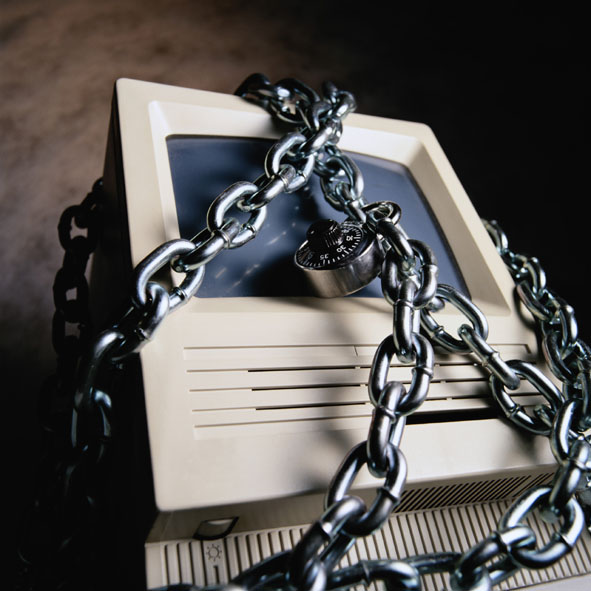
But freedom on the Internet is at risk. It’s under attack from greedy Internet service providers, intrusive governments, and powerful corporations. Not only is the success of the Internet at stake here, but also the success of our modern democracy. This vital service – the Internet – which has become such an essential part of our daily lives, cannot be curtailed, blocked, censored, slowed down, spied on, exclusivized, turned into a tiered service (a la cable TV), or otherwise modified from its current form without destroying the freedom which makes the Internet, well, the Internet.
The Internet has been such a powerful force in the world for freedom of thought, freedom of information, and freedom of expression. We should not let anyone – especially powerful companies and governments – mess with our Internet.
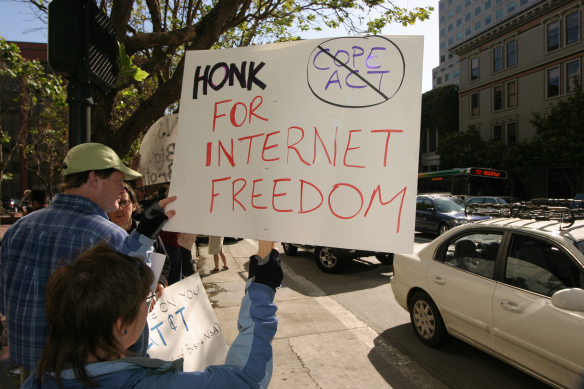
Broken Promises
The republican revolutionaries promised us a society where everybody can participate as an equal in political debates, and where everyone has a voice and an audience. The liberals promised personal growth, the right of all citizens to develop their arguments, skills and individuality. The radicals promised freedom of speech as a way to expose prejudice and corruption. These are great ideals. Wonderful promises. Too bad they weren’t kept.
– Eric Ringmar, A Blogger’s Manifesto
In every country where democracy has taken hold, people have the right to express themselves freely. This is a core freedom, a fundamental right. Free speech is often heralded as the single most important right that sets Western liberal democracies apart from the rest of the governed world – and rightly so.
Robert F. Kennedy once said in his famous Day of Affirmation Address that the first and most critical element of individual liberty is “the freedom of speech; the right to express and communicate ideas, to set oneself apart from the dumb beasts of field and forest . . .”. Freedom of speech is the very essence of democracy, without which accountability and transparency are not possible. John Stuart Mill, a famous liberal thinker, wrote in his essay On Liberty in Utilitarianism that “ . . . there ought to exist the fullest liberty of professing and discussing, as a matter of ethical conviction, any doctrine, however immoral it might be considered”.
Free speech was thought by many early liberal thinkers to be so important that even unfavorable or offensive speech should be protected, lest the slippery slope of censorship cause all speech to become less free. As Voltaire put it, “I disapprove of what you say, but I will defend to the death your right to say it.” **Freedom of speech is a basic, essential characteristic of western society **– its importance to the functions of democracy should not be underestimated.

Unfortunately, free speech has been stifled and repressed throughout much of American history. The founders’ idealistic vision of an America where every individual has the right to speak freely came true in principle, but ultimately failed in practice. For much of the nineteenth and twentieth centuries, the elite class – owners of the large news outlets, printing presses, and TV networks – acted as the de facto arbiters of public opinion.
These media conglomerates severely curtailed public discourse by controlling what we saw, heard, and read. The common man has no access to the machinery of mass media, and thus, has no means to share his views with a wide audience. In effect, the common man was voiceless and powerless throughout much of American history, slave to the dictates of corporate media conglomerates that shape the public agenda for their benefit.
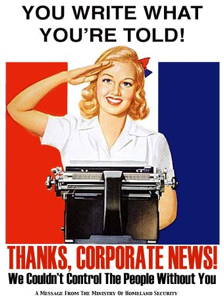
“So what?” some observers might ask. “What is wrong with corporations controlling the media? The various news outlets offer a diverse set of viewpoints and the public has the free choice to consume whichever news source they want, right?” Unfortunately, there is growing body of academic work confirming that corporate media is not offering a diverse set of viewpoints, despite how it may look on the surface. ** **
Noam Chomsky, American linguist and U.S. media and foreign policy critic wrote, “The media serves the interests of state and corporate power, which are closely interlinked, framing their reporting and analysis in a manner supportive of established privilege and **limiting debate and discussion **accordingly.” Other academics and industry experts agree that freedom of speech has suffered throughout the corporate media era.
Sam Donaldson, ABC news correspondent, once argued that “The press . . . traditionally sides with authority and the establishment.” This sentiment was echoed by David Barsamian, journalist and founder of Alternative Radio, a Colorado-based talk program heard on 125 radio stations around the world. Barsamian believes that “One of the intentions of corporate-controlled media is to instill in people a sense of disempowerment, of immobilization and paralysis. Its outcome is to turn you into good consumers. It is to keep people isolated, to feel that there is no possibility for social change.”
Most news outlets serve the interests of the rich and powerful, whose main goal, all too often, is the preservation of the status quo. Indeed, the corporations that report narrow perspectives in the mainstream news are **the very same corporations **that stand to benefit from maintaining the status quo.
The film “Network”, a 1976 classic
A quick tangent. Here are a few video clips from the film Network for you to think about. Even though the film was made 1976, the clips are even more relevant today.
I’m Mad As Hell, and I Won’t Take No For an Answer!
The Most Awesome God-Damned Propaganda Force in the Whole Godless World
The Death of the Individual. The World is Run By Corporations.
Thanks to my friend Lekan Wang for recommending that last clip!
Concentration of Media Ownership
The voice of the common man cannot be heard when the control of the press is concentrated among such a small number of players.
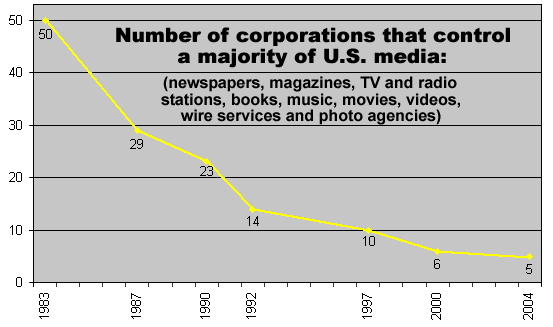
Political freedom is a society’s safety valve, allowing the passionately critical a nonviolent way to express their dissatisfaction with the status quo.
– David Cole, “Quotes on Democracy”
While the “diverse spectrum” of corporate news outlets has created the illusion of a free and fair press, the increasing trend of media consolidation over the last two centuries is even beginning to threaten this illusion. Corporate media consolidation – the majority of media outlets being owned by a small number of conglomerates and corporations – is an increasing problem that threatens free and fair political discourse in the United States.
Americans are increasingly realizing the negative implications that concentration of media ownership is having on free and fair political discourse. Former CBS News anchorman** Walter Cronkite**, who has lobbied the FCC against adopting relaxed media ownership guidelines, was quoted in BusinessWeek as saying, “The gathering of more and more outlets under one owner clearly can be an impediment to a free and independent press.”
**This gathering of outlets under one owner has only increased over the past 25 years. **I read that “In 1983, 50 corporations controlled the vast majority of all news media in the U.S. . . . In 2004, only 5 huge corporations – Time Warner, Disney, Murdoch’s News Corporation, Bertelsmann of Germany, and Viacom (formerly CBS) – now control most of the media industry in the U.S.”
If political freedom is a society’s safety valve, what happens when the means to express this political freedom are controlled by interests that wish to maintain the status quo? In this system, how can “passionately critical Americans” express their dissatisfaction?
Short answer: they cannot; they have no voice, no free speech.
The Media Elite’s Control
The Internet Revolution: Diversification Via Citizen Media
The rise of Internet technology at the beginning of the twenty-first century permanently changed the media landscape for the better. Widespread availability of Internet access, free online publishing platforms like WordPress (which runs this blog) and Blogger, and a fermenting desire for a journalism revolution combined to quickly revolutionize the modern media landscape.
The development of the modern Internet “blogosphere”—the collection of blogs and their interconnections—form a social network in which individuals can share their views with a global audience quickly, easily, and at little to no cost. No editor or central authority can screen blog content for its political message or appropriateness. In short, anything and everything goes.
Public Citizen, a national non-profit public interest organization, described the phenomenon handily when they wrote:
The rapid growth of the Internet and Internet technologies provides a renewed opportunity for citizens to have their voices heard on a wide variety of issues, including their government, the corporations that have an increasing role in their economic security, and the unions that represent their labor interests. The Internet affords individuals the ability to exchange ideas on these and other issues with an ever-growing world community – an ability that no citizen in any previous society has had.

In short, the Internet has given voices to the voiceless and power to the powerless. **For the first time in American history, there are no filters on what can be said, no editors, and no commercial interests to prevent the truth from being reported. From the turn of the millennium onward, the Internet and its millions of blogs, forums, wikis, and social networks have started to reverse the media consolidation trend through **massive diversification. Anyone with access to the Internet can become a media creator instead of just a passive media consumer.
An Example: The War in Iraq
The potential power of Internet activists was proven in the weeks and months leading up to the Iraq War in 2003. Anti-war activists used new media – Web 2.0, social networking, and online collaboration – to organize themselves in a way that would have been impossible without Internet technology. Robert Hassan, a Senior Researcher at the University of Melbourne described it in Information Society:
As the expected invasion drew near, across the world, hundreds of thousands of activists began to plan an ‘anti-war global day of action’ for 15 February. Linked and informed through websites such as Indymedia.org and MoveOn.org, relevant information was created, shared, uploaded. Much of it offered differing opinions on the impending war from that of the institutional media, which for the most part tended to take the allied governments’ line at face value.
Thus, the Internet is the perfect tool for political dissenters to organize, raise funding, and spread their message to a global audience. Hassan goes on to say “In some ways blogs are having a discernible effect on both the political process and mainstream media whose institutional structures they threaten . . .” This evolution, commonly known as citizen media or citizen journalism, has become immensely popular, if the size of the blogosphere is any indication.
According to Technorati’s State of the Blogosphere, the blogosphere is growing by one personal web page every second. At the end of 2008, there were an estimated 133 million blogs, a 14,000 percent rise from five years previously. Obviously, most of these blogs are not about politics. People are also blogging about their everyday lives – the minutia and trifling details of their day at work, the poor customer service they received at their local electronics store, and their thoughts about the most recent episode of Lost. Blogging is just one part of a larger phenomenon of Internet interactions and conversations created with new media.

Freedom has its life in the hearts, the actions, the spirit of men and so it must be daily earned and refreshed - else like a flower cut from its life-giving roots, it will wither and die.
-– Dwight D. Eisenhower
Remix Culture: The Early Years
One of the most exciting – albeit unintended – developments to arise from the Internet revolution is the development of cyberculture: social networks, online games, chat, USENET, bulletin board systems, e-commerce, peer to peer networks, and virtual worlds. With these new technologies, people are creating new forms of social expression, mash-ups, and cultural conversations. These social expressions and Internet conversations were made possible by the convergence of technologies like YouTube, cheap video cameras, and the free video editing software that comes included with most computers.
Anyone with access to a $300 computer and camera can now take sounds and images from the culture around them and remix them to express ideas in an extremely powerful way. The techniques of video production, once only available to movie studios and TV networks, has been democratized and unleashed for use by the masses.
The Internet enables people from around the world to engage in this new form of collaborative creativity and be part of the conversation no matter where they live in the world.
This video has some great examples of remix culture:
Appropriately, it is also a remix. :)
Threats to Free Speech on the Net: Censorship and Copyright Law
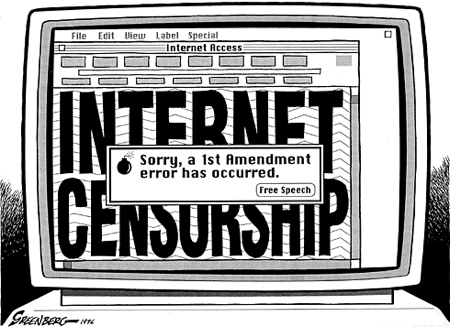
Despite the universally recognized benefits of the Internet revolution by academics and millions of Internet users everywhere, some special interests seek to undermine the core feature that has made the Internet so successful: its freedom.
There are two main threats to freedom of speech on the Internet today.
**The first threat to free speech on the Internet is website filtering and censorship by Internet Service Providers (ISPs). **Many Americans are unaware that Internet censorship is currently practiced in the United States. It’s true: the Associated Press recently caught Comcast secretly using Web filtering technologies similar to those used in China to censor the Internet.
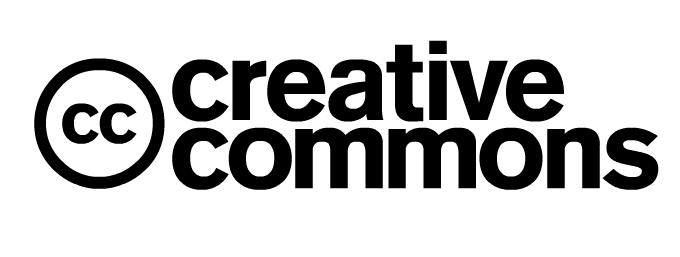
The second threat to free speech on the Internet is oppressive copyright law enforcement by media conglomerates like Viacom and Warner Brothers. The old-fashioned, literal interpretation of copyright law in a digital age is threatening to stifle the creativity of our generation by criminalizing our creative social behavior. Some awesome Stanford University professors have played a crucial role in the fight to defend free speech on the Internet. Lawrence Lessig, professor of law at Stanford Law School and founder of the Stanford Center for Internet and Society has led the fight to preserve freedom on the Internet. Professor Lessig’s work to establish Creative Commons, a groundbreaking non-profit organization “devoted to expanding the range of creative works available for others to build upon legally” has been one of his greatest successes.
Internet Censorship and Net Neutrality
Now we face a constitutive choice with the Internet—a choice between closed networks where the network operators control the user experience and open networks that are controlled by end users.
– FCC Commissioner Michael J. Copps, Statement at Stanford’s Hearing on Broadband Network Management Practices
In October 2007, the Associated Press reported that Comcast was blocking access to BitTorrent, a popular peer-to-peer file sharing protocol used by millions of Internet users. BitTorrent, like all types of peer-to-peer file sharing has legitimate uses – it is used by universities, open source software projects, and new technology companies to efficiently distribute large files directly from user to user – although it can also be used for copyright infringement. Ars Technica, a popular technology news site, covered the development:
Comcast is blocking—or at least seriously slowing down—BitTorrent transfers, regardless of whether the content is legal or not. AP chose to download a copy of the King James Bible through BitTorrent (because it is an uncopyrighted work) and went to work. In two out of its three tests, the downloads were blocked altogether, while in the remaining test, the download started after a 10-minute delay.

Comcast’s censorship of the BitTorrent protocol violates one of the core tenets of the Internet: the concept of network neutrality. While the term “network neutrality” is relatively new, the concept is not. Network neutrality (or net neutrality, for short) is a network design principle that promotes “the idea that a maximally useful public information network aspires to treat all content, sites, and platforms equally. This allows the network to carry every form of information and support every kind of application.”
In other words, net neutrality mandates that Comcast and other ISPs provide equal access to all websites and services on the Internet – no favoritism, no charging fees to website publishers to increase website speed, and no website censorship.
There are neutrality laws for other public utilities, so why shouldn’t a neutrality proposal makes sense for the Internet, which has increasing become a necessity of modern life, much like water and electricity service?
Services such as telegrams and the phone network . . . are considered common carriers under U.S. law, which means that they are considered akin to public utilities and overseen by the FCC in order to ensure fair pricing and access; such networks are expressly forbidden to give preferential treatment [to certain communications based on their contents]
Indeed, net neutrality was the standard practice for Internet service before Comcast’s lobbyists convinced the FCC to change this policy two years ago. Many Internet users are still wondering how that FCC policy change benefits consumer freedom, but have yet to find out.
Comcast offers an explanation: “We have a responsibility to manage our network to ensure all our customers have the best broadband experience possible. This means we use the latest technologies to manage our network to provide a quality experience for all Comcast subscribers.”
Of course, “latest technologies” is code for “censorship technologies.” Comcast’s censorship of BitTorrent, done in the name of network management, was nothing more than a sly effort to undercut an up-and-coming competitor to cable TV service.
Comcast is not the only ISP that publicly opposes net neutrality; so do Verizon, AT&T, Bell South, and HDNet. However, despite the chorus of corporate opposition to net neutrality, most Stanford professors, faculty in the Center for Internet and Society, and average Internet users like you and me recognize the threat that unregulated ISP censorship can have on Internet free speech.
Some Stanford professors decided to fight Comcast’s censorship in an effort to set a precedent in the U.S.
On April 17th 2008, over 600 people gathered at Stanford – widely considered to be the birthplace of the Internet economy – to discuss the future of the Internet. The Federal Communications Commission (FCC) decided to hold a public hearing at Stanford to discuss broadband network management practices and Internet-related issues in the wake of the Comcast censorship controversy. Stanford law professors Lawrence Lessig and Barbara van Schewick, and Gregory L. Rosston, Deputy Director of Stanford Institute for Economic Policy Research, gave expert testimony in support of net neutrality to the FCC commissioners, all five of which were in attendance that day.
The Commission [heard] testimony both from expert panelists, and members of the audience who [were] permitted to speak directly to the commissioners during the public comment session.
The entire Stanford faculty in attendance made compelling cases for net neutrality. Lessig, for example, stated that “[Net neutrality is] the thing that makes it all transparent, it’s open, anybody can do anything . . . It gave us transparency, openness, and freedom.”
The freedom that Lessig refers to is the guarantee for activist citizens that ISPs will not censor their controversial free speech, the guarantee for application developers that ISPs will not block or slow down their application if it competes with the ISP’s own services, and the guarantee for website publishers that ISPs will not slow down access to their websites and favor their own web properties.
The other Stanford professor in attendance, van Schewick, also made a strong case for net neutrality on the basis of consumer rights:
Allowing network providers to single out specific applications and block or degrade them . . . would harm user choice and application level innovation . . . The market will not solve this problem . . . To protect application level innovation and user choice, the FCC needs to clarify that singling out specific applications and blocking or degrading them . . . is not reasonable network management and violates the Internet policy statement.
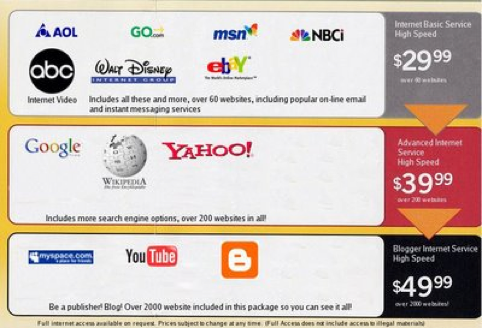
Lessig and van Schewick realize that the open, dynamic Internet – the last bastion of true free speech in the world – is at risk of becoming a television-like medium if net neutrality is not made law. Steve Elliot, an activist blogger, painted a dark picture of this television-like Internet future. As he describes it, “You pay for a small commercial package of sites you can visit and you’ll have to pay for separate subscriptions for every site that’s not in the package.” As he puts it:
If this plan is implemented, almost all smaller websites and alternative information sources will disappear over time – because most people will never find out about them! – and multinational corporations who are used to using big budgets to brute force their content into every media outlet will finally realize their dream of being able to approach the World Wide Web in the same way.
We must not let them succeed.
‘Yes We Can’ Regulate Culture With Copyright Law
“In 1906, John Philip Sousa traveled to the U.S. capital to speak about the technology which he referred to as the ‘talking machines’ [the record player]. John Philip Sousa was not a fan of the talking machines. This is what he had to say: ‘These talking machines are going to ruin the artistic development of music in this country. When I was a boy . . . in front of every house in the summer evenings you would find young people together singing the songs of the day or the old songs. Today you hear the infernal machines going night and day. We will not have a vocal chord left. The vocal chords will be eliminated by a process of evolution, as was the tail of man when he came from the ape.’” [emphasis in the original]
– Lawrence Lessig, Stanford Professor of Law
Besides the threat of Internet censorship, Stanford Professor Lawrence Lessig also recognizes copyright law as another threat to free expression on the Internet.
He has been an outspoken advocate for copyright law reform, proposing reduced legal restrictions on copyrights and trademarks in the digital realm. Lessig has dedicated most of his career to copyright reform; he sees it as the single most important issue that will define the success of the Internet in the future.
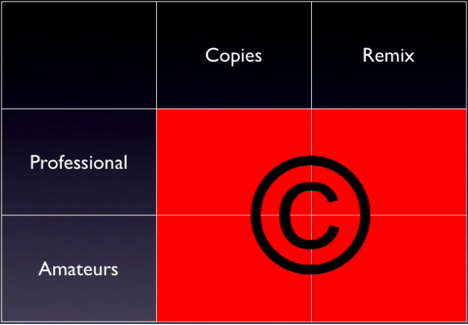
Above, you can see the current copyright situation for digital media. Neither professionals nor amateurs are allowed to copy or remix existing copyrighted works.
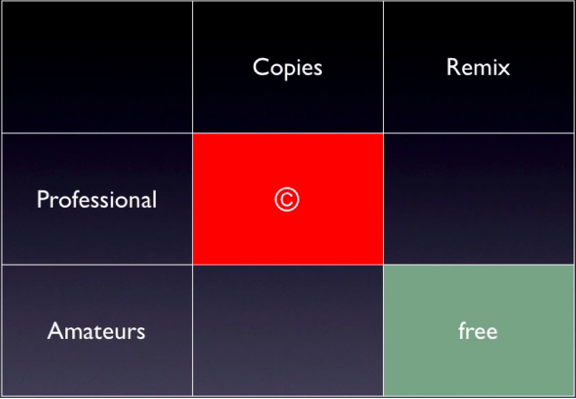
And this time we have the ideal copyright scenario, after Lessig’s suggested reforms have been implemented. He proposes that amateurs be allowed to remix and modify copyrighted works without limit (free use). Only professional copying is off-limits. The “grey areas” are left up to the copyright owner to decide.
He produces many blog posts, podcasts, and speeches arguing in great detail his reasons for proposing reduced copyright restrictions. Lessig argues that one of the most important triumphs of the Internet is its “remix culture” – a phrase that he coined to describe the widespread acceptance and encouragement of derivative works (works that include copyright protected elements of other works).
A mainstream example of “remix culture” is hip-hop culture, which makes heavy use of music sampling (taking part of a song and reusing it in a different song). The Internet, Lessig argues, has also developed a remix culture; hundreds of examples of Internet videos come to mind that substantiate this claim (see the videos at the bottom of this post for some popular examples).
Remixing and reusing previous work – with or without the permission of the author – is central to Internet culture. This raises obvious questions:
Is this remixing in fact copyright infringement?
Is remixing ethical? Should the copyright law change to reflect changes in technology?
A literal interpretation of copyright law contends that any unauthorized copying of copyrighted material (without explicit permission from the owner) is a violation. However, the issue is really not this simple. Lessig argues that the enforcement of copyright, which was originally meant to regulate the physical reproduction of written works, does not make sense in a digital medium, where every access and use of content produces a “copy.”
The architecture of copyright law (that gets triggered whenever a copy is made) and the architecture of digital technology (where every single use of “culture” produces a copy) have combined to produce a radical change in the scope and reach of copyright.
The combination of these architectures means the death to legal creativity and the stifling of much free expression on the Internet.
In print media, amateurs are allowed to remix copyrighted works without limit for noncommercial purposes. Even professionals have the right to remix copyrighted works for parody and criticism. Why do these same rights not transfer from print media into the digital realm?
For example, I regularly quote short snippets of copyrighted work for use in academic papers – indeed, I do so many times – even in this very blog post! – with attribution but without the advance permission of the copyright holder.
Why is this basic academic freedom not translated to the digital realm?
The law is out of sync with the technology. Copyright law must be reformed so that amateurs have the freedom to exercise their creativity and free speech, even when this involves “copying” (by the old-fashioned definition) of copyrighted work.
For some classic examples of “remix culture” the early days of the Internets, just move your eyes ever so slightly below this text and keep moving them downward until you reach the comments section. While you are there, leave some comments and let me know what you think!
Lawrence Lessig = Awesome
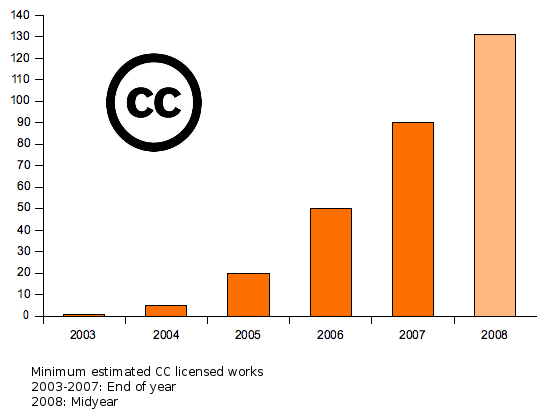
Number of Creative Commons licensed works (IN MILLIONS), plotted over time
Lessig’s efforts to reform copyright involve two main points:
1.) The law should give up its obsession with “copy.”
In the digital world, “copying” is not a meaningful act, so the law should focus its attention on something more meaningful. There are dozens of proposals for alternative copyright models, which I do not have space to cover here. The essential point is that change is needed in the law. As Lessig puts it:
We need to deregulate a significant space of culture and focus the regulation where it can do some good.
In its current form, copyright law amounts to the regulation of culture, which was clearly not its original intent.
2.) The law should distinguish between amateur and professional copying.
The law should recognize the importance of remix culture to youth culture by distinguishing between amateur and professional copying. Copyright law should encourage both amateur and professional creativity by producing incentives for the professional and promoting freedom for the amateur.
For most of the twentieth century, John Philip Sousa’s worst fears about creative production were true: the “infernal machines” – cassette players, CD players, radio, TV – robbed human culture of its creativity and of its voice. He describes:
Never before in the history of human culture had its [creative works] production become as concentrated, never before had it become as professionalized, never before had the creativity of the ordinary person become as effectively displaced . . .
However, remix culture has changed all of this, once again involving the ordinary person in the creative process. The whole social media scene allows forms of expression that were unimaginable just a few decades ago. It is essential for the law to recognize the importance of a participatory creative culture and seek to protect and promote it at all costs.
In his quest to reform copyright law, Lessig started Creative Commons, an alternative license to the standard copyright (©). While the purpose of copyright licensing is to *restrict *rights to use the content, the purpose of Lessig’s Creative Commons licensing is to explicitly *give away *rights that the content creator does not want to reserve for himself.
The Creative Commons FAQ describes the idea underlying the organization:
Some people may not want to exercise all of the intellectual property rights the law affords them. We believe there is an unmet demand for an easy yet reliable way to tell the world “Some rights reserved” or even “No rights reserved.” Many people have long since concluded that all-out copyright doesn’t help them gain the exposure and widespread distribution they want.
The effects of Lessig’s work with Creative Commons have been profound. The most recent statistics from December 2008 reveal that an incredible 150 million works are now licensed under Creative Commons, creating a breadth and depth of public domain work that was simply unimaginable in an earlier age.
This high-quality content is free to use, remix, and build off of in new creative works. How awesome is that?
Conclusion
If I’ve driven any point home in this essay, its been that** freedom of speech is a basic, essential characteristic of western society.** The Internet – what was largely an unanticipated consequence of military funded research – has turned out to be the most important democratizing force in the history of the world.
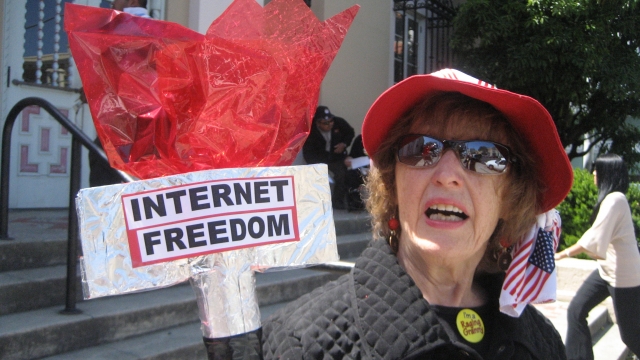
The Internet’s success has largely been due to its free and open nature. Its importance to the functions of western democracy, as well as its power to bring information and democracy to the rest of the world should not be underestimated. The flourishing of a “remix culture” has made possible new forms of social expression and Internet conversations that give power and influence to the young people of the world.
The Internet has been such a powerful force in the world for freedom of thought, freedom of information, and freedom of expression. We should not let anyone — especially powerful companies and governments — mess with our Internet.
It’s our job to increase the protection for free speech on the Internet and do our best to reform out-of-date and unjust government policies. We are the only ones who can protect our rights from those who seek to oppress us.
And with that, I will end my final post on this topic. Whew! Glad that’s over! :-D Hopefully I haven’t bored anyone too much over the past few weeks. If I did my job then hopefully you learned something new and feel motivated and excited about freedom of speech on the net and want to support new and better copyright laws, net neutrality, and other related initiatives!
If you’d like further reading, then check out SaveTheInternet.com and SaveTheNews.org.
Bibliographic Notes
“Approximate Minimum Total CC Licensed Works.” Chart. Metrics - CC Wiki. 18 May 2009 <http://wiki.creativecommons.org/Metrics>.
Cheng, Jacqui. “Evidence Mounts that Comcast is Targeting BitTorrent Traffic.” Ars Technica. 18 May 2009 <http://arstechnica.com/old/content/2007/10/evidence-mounts-that-comcast-is-targeting-bittorrent-traffic.ars>.
“Choosing Your Blogging Platform: Blogger or Wordpress.” Seo Talk with Neuracom. 18 May 2009 <http://blog.neuracom.com/blogging/>.
“Concentration of Media Ownership.” Wikipedia, the free encyclopedia. 18 May 2009 <http://en.wikipedia.org/wiki/Media_consolidation>.
Copps, Michael J. “Statement of Commisioner.” En Banc Hearing on Broadband Network Management Practices. Stanford University, Palo Alto. 17 Apr. 2008. Save The Internet. 18 May 2009 <http://hraunfoss.fcc.gov/edocs_public/attachmatch/DOC-281625A1.pdf>.
“Corporate Media and Threat to Democracy.” Third World Traveler. 18 May 2009 <http://www.thirdworldtraveler.com/Corporate_Media/CorpMedia_ThreatDemocracy.html>.
Elliot, Steve. “Why Net Neutrality Matters: Protect Internet Freedom - Or Lose It.” Reality Catcher. 18 May 2009 <http://realitycatcher-alapoet.blogspot.com/2008/06/support-net-neutrality-or-internet.html>.
“Frequently Asked Questions - CC Wiki.” Creative Commons Wiki. 18 May 2009 <http://wiki.creativecommons.org/FAQ>.
Greenburg, Steve. “Internet Censorship.” Cartoon. 13 July 1996. 18 May 2009 <http://greenberg-art.com/.Toons/.Toons,%20Media/InternetBomb.html>.
“Hacking for Christ.” MozillaZine Weblogs. 18 May 2009 <http://weblogs.mozillazine.org/gerv/archives/2007/06/>.
Hassan, Robert. The Information Society: Cyber Dreams and Digital Nightmares. Polity.
Hepworth, Katherine. “Yes We Can: Barack Obama, Graphic Design and Liberal Democratic Process.” Re-public : Re-imagining Democracy. 18 May 2009 <http://www.re-public.gr/en/?p=352>.
Hertsgaard, Mark. On Bended Knee: The Press and the Reagan Presidency. New York: Farrar, Straus, Giroux, 1988.
“Internet Free Speech.” Public Citizen. 18 May 2009 <http://www.citizen.org/litigation/briefs/IntFreeSpch/>.
Lessig, Lawrence. “Keeping Culture Free.” New Zealand, Auckland. Blip.TV. 18 May 2009 <http://lessig.blip.tv/file/1440091/>.
“Media Control.” Third World Traveler. 18 May 2009 <http://www.thirdworldtraveler.com/Media_control_propaganda/Media_Control.html>.
“Media Reform Information Center.” Corporate Accountability Project. 18 May 2009 <http://www.corporations.org/media/>.
Mill, John S. On Liberty. 18 May 2009 <http://books.google.com/books?id=uWAJAAAAQAAJ>.
“Network Neutrality in the United States.” Wikipedia, the free encyclopedia. 18 May 2009 <http://en.wikipedia.org/wiki/Network_neutrality_in_the_United_States>.
“Panel Discussion 2 ? Consumer Access to Emerging Internet Technologies and Applications.” VON TV - The Vision of IP Communications. 18 May 2009 <http://www.vontv.net/events/080417/>.
“Quotes on Democracy, Freedom and Corporate Power.” Reclaim Democracy! Revoke Corporate Corruption of American Democracy. 18 May 2009 <http://www.reclaimdemocracy.org/corporate_quotes_archive.html>.
“Remix Culture.” Wikipedia, the free encyclopedia. 18 May 2009 <http://en.wikipedia.org/wiki/Remix_culture>.
Ringmar, Erik. Blogger’s Manifesto: Free Speech and Censorship in the Age of the Internet. London: Anthem P, 2007.
Ripples of Hope: Great American Civil Rights Speeches. New York: Basic Civitas Books, 2003. 18 May 2009.
Sanchez, Camilo. Net Neutrality Logo. Digital image. Wikipedia, the free encyclopedia. 18 May 2009 <http://en.wikipedia.org/wiki/File:NetNeutrality_logo.svg>.
Schenck, Ernie. “This Is The Blogosphere. Quick, Find Your Brand.” Hill | Holliday. 18 May 2009 <http://www.hhcc.com/?p=323>.
“Stanford - FCC Public Hearing on the Future of the Internet.” Save the Internet. 18 May 2009 <http://www.savetheinternet.com/=stanford>.
“State of the Blogosphere 2008.” Technorati Blog. Ed. Technorati. 18 May 2009 <http://technorati.com/blogging/state-of-the-blogosphere>.
Wu, Tim. “Network Neutrality FAQ.” Tim Wu’s Home Page. 18 May 2009 <http://timwu.org/network_neutrality.html>.
Yang, Catherine. “The FCC’s Loner is No Longer So Lonely.” BusinessWeek 24 Mar. 2003.
You Write What You’re Told! Digital image. Propaganda and War. 18 May 2009 <http://www.media-studies.ca/articles/war_propaganda.htm>.
YouTube.com. 18 May 2009 <https://www.youtube.com>.
(If you liked this, you might like Cheating in Video Games.)
